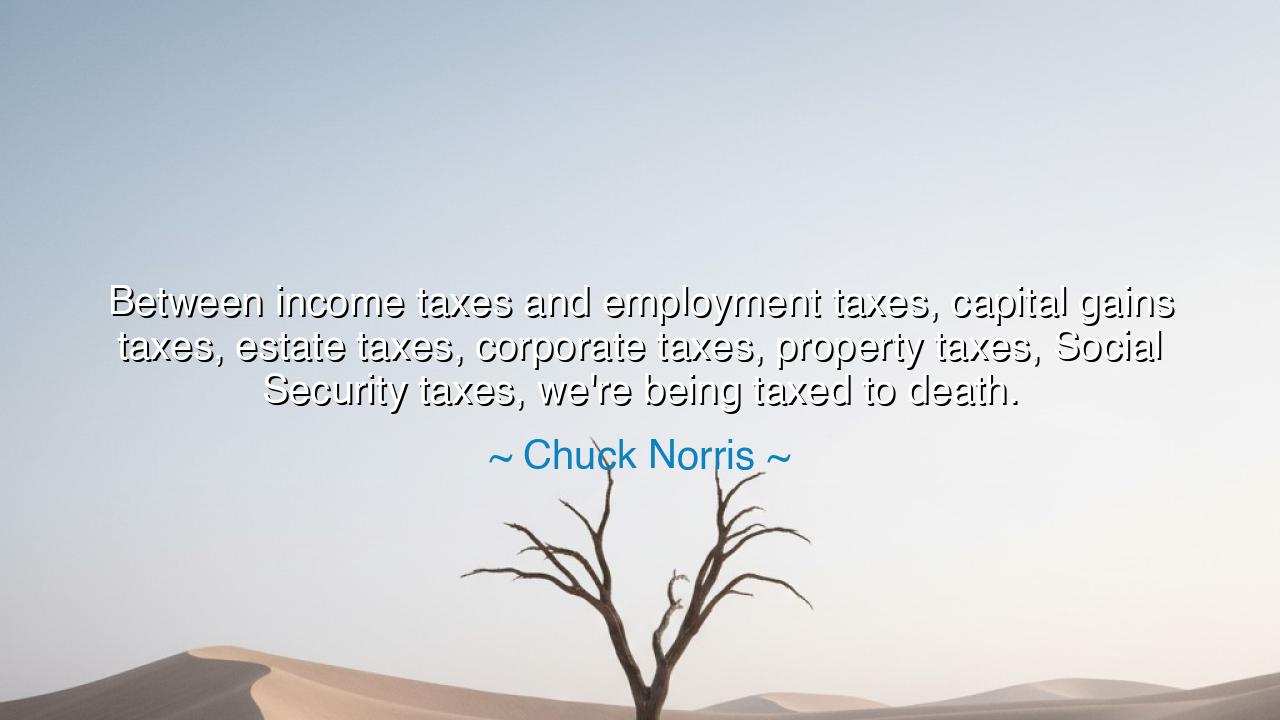
Between income taxes and employment taxes, capital gains taxes
Between income taxes and employment taxes, capital gains taxes, estate taxes, corporate taxes, property taxes, Social Security taxes, we're being taxed to death.






"Between income taxes and employment taxes, capital gains taxes, estate taxes, corporate taxes, property taxes, Social Security taxes, we're being taxed to death." Thus spoke Chuck Norris, not as the invincible warrior of film, but as a citizen reflecting on the burdens of his nation. In these words lies a cry that echoes across generations: the lament of the common man who feels the weight of the state upon his shoulders. His words are not merely complaint, but warning—a recognition that when the fruits of labor are endlessly consumed by the machinery of governance, the spirit of a people begins to decay. For even the strongest among men, Norris reminds us, cannot stand unbroken beneath the slow crush of endless taxation.
To understand the meaning of this saying, one must see beyond the surface of economics and into the heart of freedom itself. Taxes, in their purest form, are the means by which a society sustains itself. They build roads, educate children, defend borders, and provide care for the needy. Yet, as history has shown, when the balance of burden and benefit is lost, taxation becomes not a tool of service, but a weapon of oppression. Norris’s words, though forged in the modern age, carry the same fire that burned in the hearts of those who cried “no taxation without representation” centuries before him. His lament is not about coin alone, but about the sacred bond between the citizen and the state, and how easily it can be betrayed.
In ancient Rome, the people once suffered under the same yoke. The empire, bloated by war and luxury, demanded ever more from its citizens—gold, grain, labor. Farmers abandoned their fields, merchants fled their cities, and the greatness of Rome crumbled beneath its own weight. The philosopher Cicero, witnessing this decline, wrote that “the sinews of war are infinite money,” and yet he warned that money extracted unjustly from the people corrodes the very foundation of the republic. So too, in the modern world, Norris’s words serve as a reminder that prosperity cannot thrive under perpetual extraction, and that the power to tax is also the power to enslave, if wielded without restraint.
Yet within his declaration there is also irony and wisdom, for Chuck Norris himself—an actor, martial artist, and symbol of rugged independence—speaks not as one who shirks duty, but as one who honors hard work. His frustration is born from love of country, from a belief that the individual, not the institution, is the beating heart of civilization. When he says “we’re being taxed to death,” he does not reject the duty to contribute; rather, he mourns the loss of balance, where citizens labor endlessly, not for their dreams, but for a system that consumes their effort without gratitude or accountability. His words are not rebellion, but a call to remembrance: that governments exist to serve, not to suffocate.
The truth he speaks is eternal. When the laborer toils without reward, when the merchant’s gain is stripped before it blooms, when inheritance is claimed not by family but by the state, a quiet despair seeps into the soul of a people. Innovation falters. Courage wanes. The song of liberty grows faint. History has shown this pattern time and again—from the peasants of medieval Europe crushed by the tithe and the crown, to the citizens of the French monarchy who rose in fury against unjust levies. Excessive taxation, like rust upon iron, wears down the will of the people until even their faith in fairness is corroded.
But Norris, ever the fighter, does not speak these words in defeat. Beneath his lament lies a challenge—a summons to awareness, to stewardship. He calls for a citizenry that does not drift into complacency, that demands accountability from its rulers, and that guards the principle of fairness as one guards his own home. He reminds us that freedom requires vigilance, not only on the battlefield but in the ledger book, for tyranny need not come with chains and armies; it can come quietly, through laws and levies, through the silent erosion of self-determination.
So, my listener, take this teaching into your heart: give to your nation what is just, but never surrender what is sacred. Work with integrity, pay what is fair, but do not bow to excess. Question not the duty to contribute, but the wisdom of those who consume what you give. Remember always that the health of a republic depends not on the size of its treasury, but on the strength of its people’s spirit. A nation that feeds upon its citizens’ lifeblood will one day starve itself, but a nation that honors the fruit of honest labor will flourish for generations.
Therefore, let Chuck Norris’s words not be taken as cynicism, but as a call to balance and justice. Strive for a world where prosperity and compassion coexist, where governments act as guardians, not masters. Let every man and woman remember that they are not merely subjects of taxation, but stewards of liberty. For when a people know both the power of their labor and the dignity of their freedom, no tax, however great, can ever defeat their spirit.






AAdministratorAdministrator
Welcome, honored guests. Please leave a comment, we will respond soon